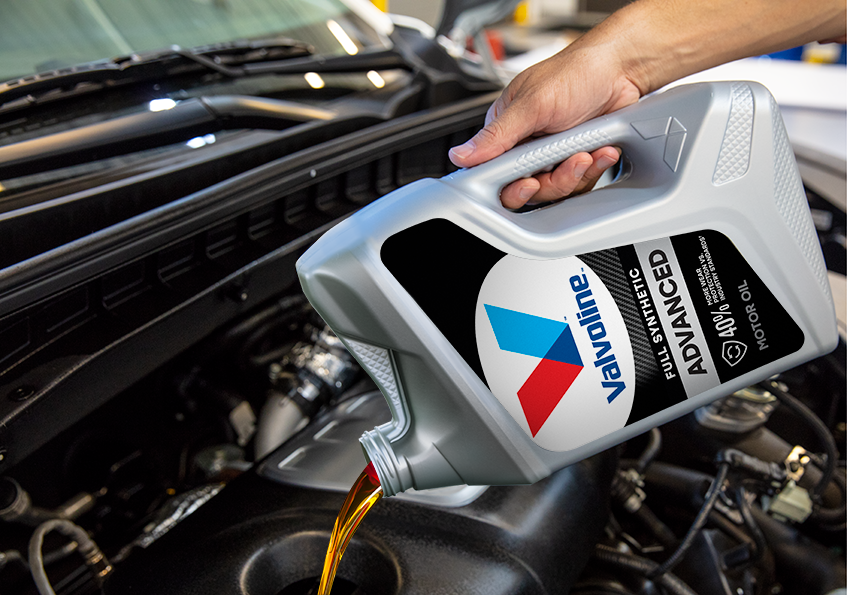Most of us probably recognize that synthetic motor oils like Valvoline Advanced Full Synthetic provide superior protection for cars’ engines operating in high-stress conditions and can reduce wear by as much as 50 percent. But how many of us realize that our own hard-working cars, trucks, and SUVs are the ones in those high-stress conditions?
It’s true. It isn’t just the plow trucks working around the clock and the police and taxi drivers who put their vehicles through the wringer. Your everyday driving probably qualifies as “severe,” especially if it involves commuting in traffic or making short trips.
This is why most cars can benefit from using Valvoline Advanced Full Synthetic motor oils, which the company has demonstrated by obtaining 50 percent better wear performance in the Sequence IVA engine test versus the ILSAC GF-5 limit.
“Everyday driving can be severe,” stated Michael Warholic, Valvoline’s light duty lubricant technology manager. “Non-severe driving? That’s cruising the Interstate at a steady 60mph. Severe driving? That’s a loaded-down minivan going through ten stop lights. It’s stopping and starting. That is not where the engine wants to live.”

“Most people on the road now, whether you know it or not, are doing some form of severe driving. The engine doesn’t prefer to operate that way. It wants to run in the sweet spot it was designed for.”
This is especially true as drivers increasingly switch away from conventional sedans toward light trucks like SUVs, minivans, or pickups. “With an SUV, you can be towing, putting stuff on the roof, and it’s also a larger and heavier vehicle,” Warholic points out.
Vehicle size is important because carmakers typically use the same engines from smaller, lighter cars in their larger, heavier SUVs, which means those engines must work harder to move the additional mass. “The load is higher even when the vehicle isn’t loaded,” Warholic noted. “It is going to be asked to do more than in a smaller vehicle, it is going to work harder.”
Consumer Reports chief mechanic John Ibbotson cites three specific situations that can stress the oil in any size car: drivers who are making short trips, drivers who live where it gets very hot or very cold, and drivers with older cars whose engines are prone to more sludge buildup.
Rather than suggest that your engine think of its “happy place” while enduring such punishment, Warholic instead points to using Valvoline Advanced Full Synthetic Motor Oils. Indeed, this could be why most new cars are delivered with either full synthetic or blended synthetic oil from the factory. According to Mel Yu, auto analyst for Consumer Reports, 70 percent of 2019 vehicles came with some form of synthetic oil in their engines.

There are good reasons why carmakers and drivers are choosing synthetics and better reasons why they should focus specifically on full synthetics, like Valvoline Advanced Full Synthetic.
“The synthetic foundation provides better protection,” Warholic explained. “Also, our Valvoline Advanced Full Synthetic has additional boosters to minimize the effects of heat. At higher temperatures, you get thinner oil that can cause more wear as the high spots on the metal surfaces can break through the layer of oil and rub against each other.”
That causes valvetrain wear, timing chain wear, and bearing wear, among other problems, Warholic said. A full synthetic oil combined with the right additives minimizes these problems, reducing wear by 50 percent in the ILSAC GF-5 test.
“With less wear, the engine’s going to last longer,” Warholic observed. “Not only that, it will make it run better. In terms of performance, it may also result in better fuel economy.”
The thing about such industry tests, though, is that they only set minimum standards, and Valvoline Advanced Full Synthetic vastly exceeds the ILSAC minimums as well as those for certification by Chrysler, Ford, and General Motors.
Indeed, Valvoline ran its oil for twice as long as required and still passed a critical GM performance test, according to Warholic. That’s the benefit of Valvoline’s 150 years of experience optimizing motor oils.
It is no surprise that high-performance models like the 2020 Ford Mustang Shelby GT500 and the 2020 Chevrolet Corvette Stingray both come with full synthetic motor oil and only recommend such oil.
“Ford Performance uses synthetic oil in the Shelby GT500 because it provides a higher level of performance and protection than conventional oil,” explained Pat Morgan, Ford Performance Powertrain Manager. “Synthetic oil holds up better to higher temperatures and doesn’t break down as fast as conventional oil, which is ideal for a car of this performance level.”
Those of us who aren’t lucky enough to spend time tearing around tracks in amazing performance cars like these can at least enjoy the same level of protection for our cars’ engines, as they toil just as hard in less glamorous circumstances. Consider it a Shelby or Corvette upgrade to your more practical ride.
- The content above was submitted by a guest contributor and is for informational purposes only. The views and opinions expressed in this content are those of the guest contributor and do not reflect the views and opinions of Valvoline LLC.

 Dan Carney
Dan Carney